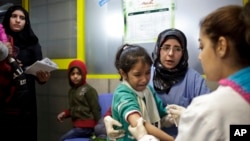The World Health Organization (WHO) says the global campaign to eliminate measles is in trouble as progress toward that goal has stalled. WHO reports about 145,700 children died from measles in 2013, an increase of 23,700 from the previous year.
WHO says a decline in routine measles vaccine coverage has resulted in large outbreaks of this highly contagious disease in recent years. It also has stalled global efforts to eradicate measles by 2015.
The U.N. agency says measles immunization efforts are hampered by lack of money, weak health systems and not enough awareness of the importance of vaccinating children against this killer disease. It notes it only costs about one dollar to vaccinate a child.
WHO estimates 15.6 million deaths have been prevented through vaccination between 2000 and 2013.
Dr. Robert Perry of the WHO Department of Immunization, Vaccines and Biologicals, says these huge reductions in mortality are tapering off because of poor vaccine coverage.
“So, now we are in a crossroads," he said. "We need adequate funding. We need to find ways to increase the first dose coverage and to increase the uptake of a second dose in routine as well as conducting high quality campaigns or we are likely to see more outbreaks like we have seen in the last few years.”
The World Health Organization reports in 2013 large outbreaks occurred in China, Democratic Republic of Congo and Nigeria. It reports more than 70 percent of global measles deaths occurred last year in just six countries - India, Nigeria, Pakistan, Ethiopia, Indonesia, and Democratic Republic of Congo.
Perry says conflict-ridden Iraq and Syria and neighboring countries are having serious problems with measles outbreaks.
“These are countries, especially like Syria and Jordan that had very good coverage, had essentially eliminated measles and blocked any measles transmission," he said. "Because of the conflict in Syria, there has been huge population movement, so now there is - the population that used to be all vaccinated now is not vaccinated in Syria and they have moved to other countries. So, now these countries have big populations of kids that are not being reached. And, the conflict in Iraq and Syria is having a bad effect on the ability of teams to reach children. So, there is a lot of measles in those countries.”
Perry notes conflict in Africa is having a similar effect on efforts to reduce death from measles.
He says the conflict between the government and Boko Haram militants in northeast Nigeria is creating great instability and making large vaccination campaigns virtually impossible.
Although Central African Republic also is hard hit by conflict, he says it was possible to mount a successful measles vaccination campaign there last year. But he adds a number of areas were off limits because of fighting, so many children have been missed.




